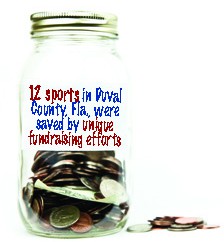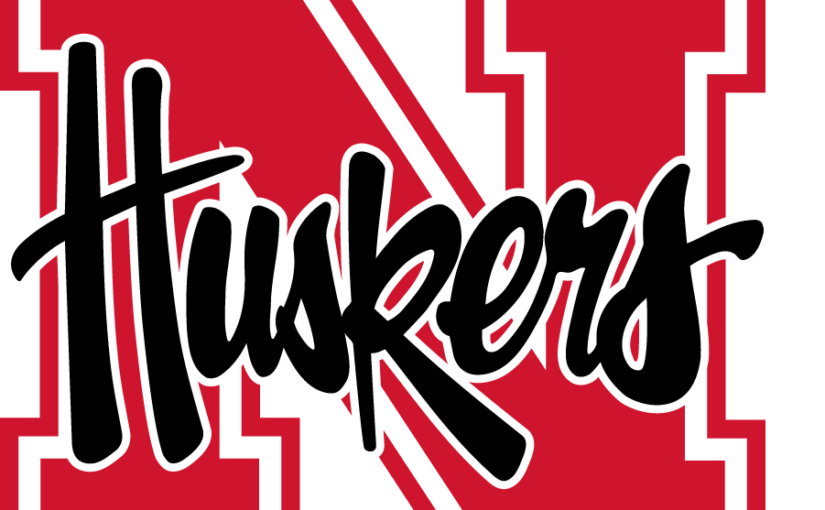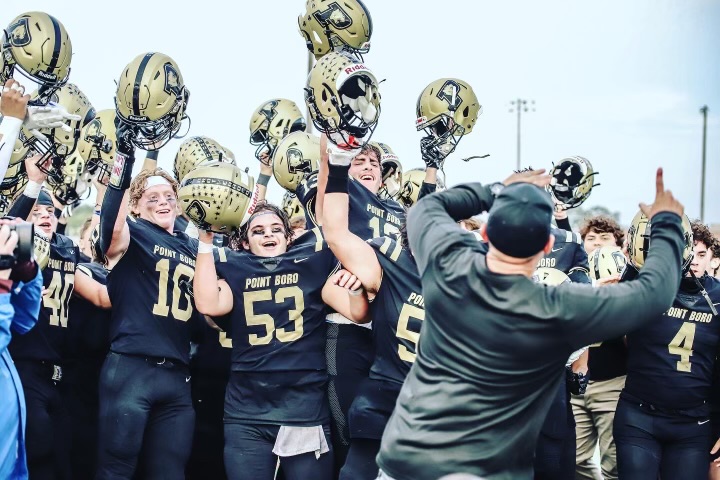Fundraising $587K in four-and-a-half months
Last year, Duval County (Jacksonville, Fla.) Public Schools faced a $90 million deficit and athletic director Jon Fox had the unenviable task of having to cut sports for budgeting purposes. A 40-year industry veteran who has spent the last 14 as Duvals athletic director, Fox put together a plan to cut 12 sports across the county while attempting to impact the least amount of student-athletes.
Duval County encompasses 17 high schools with 177 coaches and 123,000 students. Once the announcement was made that boys and girls cross country, boys and girls golf, boys and girls tennis, boys and girls lacrosse, wrestling, slow-pitch softball and boys and girls junior varsity soccer were to be eliminated, Fox sprung into action to save these sports. He needed to raise $587,000 and only had four and a half months to do so.
I was hopeful something might change with the funding but I needed to reach out to groups to enable us to fundraise effectively and get these sports reinstated, Fox says. There were a lot of sleepless nights last summer and I was fearful wed get some sports back and not others.But, by the third week in July we brought back all fall sports, pushed ahead and eventually saved all 12 sports from being cut by raising $587,000.
Foxs first, and most important, step in the fundraising process came when forming a group to spearhead each campaign for each individual sport. With four decades of experience, he possessed an impressive contact list of the areas biggest movers and shakers associated with the sports in question. For example, he sought out the assistance of the North Florida PGA to help on the golf side and a prominent member of the running community (and store owner) to assist the cross-country efforts.
Jons reputation, credibility and personal relationships with people in the community and corporate sponsors went a long way, but his best move was to task groups closely connected to that sport to assist in raising the funds, says Lindsey Brock, a managing attorney with the Florida law firm Rumrell & Brock, P.A., who participated in the fundraising by setting up a non-profit fund and actively soliciting donations. Its a brilliant move to bring in passionate people to a cause that is personal to them.
Fox says utilizing the groups in your area is a logical first step to being organized and efficient. In Florida, we have large golf and tennis communities, and Jacksonville has a huge city-wide running program, so it makes sense to go to these people first, he says. Its a bit more difficult in some of the other sports but then you turn to parents who also are emotionally invested in the effort.
Through hard work, innovative thinking and mobilizing efforts for large and small contributions, Duval County has an impressive fundraising story to tell.
The nuts & bolts
After reaching out to the individual groups for each sport, Fox then had to get a plan in place for collections, accounting and all the little things that go on behind the scenes. It’s not all just accepting oversized checks from corporate sponsors.
Brock knew Fox from their days at Duval Countys Terry Parker High School. Brock works closely with the alumni at the school and about five years ago set up the Terry Parker High School Alumni Fund as a 501(c)(3) organization.
 I had heard the football team members were sharing helmets at the time, so some of us got together, held a charity golf tournament, raised $30,000 and gave it to the school for new helmets, Brock reports. We put together a board of directors, bylaws and organized fundraising just for that school. We started with athletics, then expanded into all extracurricular activities. We wanted to provide an organizational structure for other high school alumni associations.
I had heard the football team members were sharing helmets at the time, so some of us got together, held a charity golf tournament, raised $30,000 and gave it to the school for new helmets, Brock reports. We put together a board of directors, bylaws and organized fundraising just for that school. We started with athletics, then expanded into all extracurricular activities. We wanted to provide an organizational structure for other high school alumni associations.
When Fox started reaching out for support, Brock was quick to respond and used his expertise to set up an umbrella fund called Save Duval County Sports as the general fundraising arm. We set up a 501(c)(3) to lawfully solicit money. Some people are leery of giving directly to the school because they think the money goes into a black hole.
With a non-profit, we have to provide clear, clean financials that are publicly available. People are more comfortable giving in this manner.
The next step for Brock and Mark Schou, a Jacksonville area accountant, was to start actively seeking donations from civic-minded corporations by appealing to them with the story of what athletics mean in the lives of students.
We discussed how athletics are a vital component to the education process and how athletes learn to compete properly within the rules while taking wins and losses with grace. Some of these lessons aren’t as easily learned in a classroom, Brock says of his strategy of selecting some individualized success stories to focus on when making presentations.
Save Duval County Sports also pushed ahead with advertisements in local media, a letter-writing campaign and a concentrated blitz of telephone calls. The group also had to make sure all contributors received their thank-you letter, which comes in handy at tax time as all donations are tax-deductible.
One effort that netted a good chunk of money (slightly less than $40,000 according to Brock) was a day-long radio-a-thon in conjunction with a local radio station. Listeners were presented with heartstring-pulling stories and the opportunity to donate.
We had current students telling their stories and former students discussing how they ended up at college due to high school sports, Brock says. We gave people good stories of the real-life impact these cuts were going to have.
Golf groups big idea
Golf and Florida go hand-in-hand, so the idea of having 17 schools dropping boys and girls golf did not sit well with Mike Lynch, who last year was the president of the North Florida PGA. Lynch had known Fox for quite awhile and reached out to see what he could do to help.
Taking 17 possible teams out of the mix diminishes the competition for everyone, and takes away opportunities for some good golfers. So, the golf community in northern Florida knew we needed to do something, Lynch says.
Lynch says his plan was a simple one. He knew the district needed $70,000 to fund boys and girls golf at all 17 high schools. So, he set up the Super Golf Raffle and planned an additional charity golf tournament.
Lynch worked with the PGA, the Players Championship and many of the high-end golf courses in Florida and around the country. He had 25 complimentary foursomes donated from places like TPC Stadium, Pablo Creek and Sawgrass Country Club. With these high-value foursomes (valued at thousands of dollars of free golf) donated to the cause, Lynch then asked that the local golf shops and retail stores sell raffle tickets to win these foursomes. The raffle tickets were $100 each with a limit of 600 tickets to be sold, which totals $60,000. 
The winner of the raffle had the opportunity to choose 12 of the 25 high-end, complimentary foursomes at the participating clubs. The second-place winner chose eight foursomes and the third-place person received the final five foursomes.
The charity golf tournament aimed to raise the additional $10,000 with a cost of $125/player or $500/foursome (tax-deductible). The price included golf, lunch, tee gift, range balls, awards party, on-course beverages and prizes. Get 20 foursomes signed up and there is $10,000. Sponsors helped offset some of the costs of the event.
It seemed like a simple math equation but I had no idea how it would pan out, admits Lynch. It came down to the sheer will of the people to make this successful. The golf community here is a giving group of people. We knew we had to do everything possible to save high school golf here.
This is the type of fundraiser anyone can do when you have the right group of motivated people working with you.
Running down the money
Fox knew who to approach about assisting the cross-country fundraising effortsDoug Alred. Alred owns 1st Place Sports, which is a specialty running store with five Jacksonville-area locations. He organizes many of the local running events in the city and many cross-country runners go to Alreds store for their shoes prior to the start of each season.
We have a list of 40,000 email addresses of runners in the area, so we used that to contact everyone about fundraising, Alred says. The Jacksonville Jaguars heard about us and offered to help.
The help came in the free use of Alltel Stadium for what Alred dubbed, The Stadium Challenge, which was a 5K race involving a loop around the stadium, some running around the top and mezzanine levels and finishing on the field. Alred says 2,200 runners participated and part of the success of the race hinged on having volunteers available.
Fox estimates the run raised $53,000 for the cause, which was more than enough to secure cross-country teams across Duval County for 2011.
The running community in Jacksonville is passionate. With cross-country being cut, they saw this as potentially missing out on a generation of future runners in the area, says Brock.
Other successful events
Fox says tennis is another popular sport in the state of Florida, especially with an impressive junior program in the area. The tennis arm of the fundraising group hosted an exhibition with four professionals, which tied in with an all-day clinic and a dinner.
The pros gave up their teaching salary for the day and instructed for free. By the end of the day, the event netted $25,000.
Other events that did well included a wrestling event featuring former professional wrestlers, as well as a standard car wash, which produced even greater benefits for the district as a whole.
Rather than just doing a car wash with one school involved, we brought in student-athletes from the entire district to work, Fox recalls. One of the better things that came from that day was a strong sense of camaraderie among students from different schools. Initially, it was’nt something I thought about during our planning but it definitely was a side benefit to the task at hand. Good things happen when people are fighting for a common cause.
When asked about events that didn’t do as well, Fox says, most everything we tried had a degree of success. We went with a grassroots approach. If someone really wanted to try something, we gave that person the opportunity to do it and it paid off.
Can’t happen every year
The one common theme among Fox, Brock and Lynch is while raising $587,000 in less than five months is an impressive feat, it’s not one that can be replicated year after year. The community simply cannot support it financially and the people involved cannot be expected to work this tirelessly for months on end yet again.
Our focus was to tell people this was an urgent, one-time event, says Brock who admits this strategy helped draw in more funds. Now, we have to reach out to the larger corporate people and take this to a higher level. There needs to be a larger, more permanent foundation established. Id like to see our group used as a resource and have a seat the budget table in Duval County so we can provide grants as needed as a supplement to school funding.
For Lynch, who works full-time for the Golf Channel, taking on this extra burden placed a huge strain on his time, as well as all those involved in the project.
A lot of personal time for a lot of people was lost. It’s not a complaint but it’s not something we want to do every year. It takes a lot of effort to do something like this correctly, Lynch says.
It really became all-encompassing for me. I was working on fundraising morning through the night when meetings took place, all while maintaining a level of care for our sports that were not being cut, Fox says. And, we can’t expect the community to offer this kind of money again. We have to look at alternatives moving ahead.





